It was an honour to be asked by David to launch his new collection of poetry, Strands and Ripples published by Ginninderra Press. An excited group of poets, writers, readers, family and friends gathered in the Harbourview restaurent of the Golf Club at Northbridge with stunning view of a very blue harbour as the name suggested. With enthusiasm for our first gathering and launch since lockdown and as it was third time lucky (the launch having been postponed already twice . . . it made for an exciting event.
with the toasting of some bubbley to our writing in 2022 and a delicious afternoon tea.
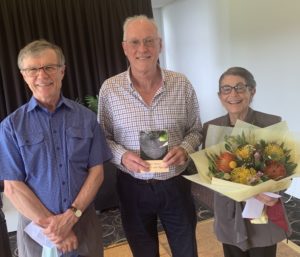

‘In this, his second collection, David Atkinson continues his themes of memory, especially of growing up on a farm in southern NSW, and the natural world, including the wildlife and people that surrounded him then and do so now. In this collection David’s scope is also wider as he extends our perspectives on the human condition. His poems are sharp in their imagery and dramatic in their language. His forms range from the traditional to the stunning use of free verse. This book is highly recommended.’ – John Egan
‘David Atkinson enables us to see things in a new light. Every theme in this collection of poetry challenges us to let him show us aspects of life from a fresh perspective. Widely published in literary journals nationally and internationally, David’s poetry always repays a careful reading. It is with enthusiasm that I welcome this new collection.’
– Colleen Keating
‘David Atkinson’s latest collection is a cornucopia of the poetic spectrum; it confirms that he is one of Australia’s finest poets. David brings a deft touch to the human condition, celebrates the wonders of nature and takes a fresh look at memories. This is a worthwhile addition to any bookshelf.’ – Decima Wraxall
His poems have been published widely in Australia, the USA and the UK. David’s previous collection, The Ablation of Time, was published, also by Ginninderra Press, in 2018. He is a poet of memory, the human condition and the natural world.
978 1 76109 108 7, 120pp
Versions

LAUNCH SPEECH TO ENCHANT YOUR CURIOSITY
Strands and Ripples by David Atkinson and published by Ginninderra Press
is launched by Colleen Keating
at Harbourvie Restaurent, Golf Club Northbridge.
It is a privilege for me to be asked by David to launch his new collection of poetry, Strands and Ripples and we acknowledge Ginninderra Press for this exceptional publication. The cover is very smart and the feel of the book is gorgeous. You must be proud David. And we are delighted for you.
David is a fellow poet and friend. There are many here who know him in different ways; his family,
those part of his past working life and now his writing life. I know David in that capacity . . .working with him in groups, workshops and the U3A poetry appreciation group.
David is a nationally and internationally published poet, many of his individual poems being published in 1journals over these past years and as a poet has won awards and commendations. I know he will be a bit shy in me saying this but in the past three months of this year 2021, David has won two first place prizes in poetry. Firstly he has been awarded first place in the prestigious Western Australian Ros Spencer Competition for a wonderfully evocative and very Australian poem called Gang-gang and for a very poignant sonnet a well deserved first place in the 2021 Scribes Writers awards . . and that for two successive years. with a Commendation in the Ros Spencer Poetry Prize last year. and a highly prized 2nd place in the Tom Collins National Poetry Competition 2019 . . . And for those who were not aware earlier this year the exciting news that David was shortlisted and commended in the recent WB Yeats Poetry Prize for Australia. David this is a very notable achievement. It is very affirming for us as writers to be honoured for the many hours we put into our creative pursuit and we can take this opportunity to congratulate you on this coveted award.
That poem surely will be the stimulus for the next book.
Thanks everyone .
We are in for a wonderful afternoon of poetry about memory, music , birds even being shuffled and shackled by crowds at The Hermitage in St. Petersburg and much more. Michael and I loved the Russian tourist poems because we experienced the same . . . David . . . I didn’t even see the black corner of the Rembrandt – being only 5 foot something and being shuffled along by the crowd.
WB Yeats writes of music and birds and some of you may know his poem, The Second Coming. It begins:
Turning and turning in the widening gyre
The falcon cannot hear the falconer;
I specifically quoted Yeats because I feel there is an empathy with him in David’s work. Of course Yeats lived in Ireland but he is often spoken of as a musical poet, with many of his poems now put to music and David is an Australian poet who writes of music and birds and now is commended in the WB Yeats award.
What I acclaim about David poems is how he seeks out his memory in music, the lyric via the immediate, the local, and turns it about like the falcon turning and widens it with a philosophical slant. This idea is shown in the opening poem:
Birthday Ballot it begins with listening to the lyrics of a Cold Chisel song, with restless youth and it widens leaving the reader in a deep thoughtful moment:
‘Staring into the dappled darkness
I touch the pain of a generation’
Many of us here are of that generation. I had to pause after that poem. Take a breath in and a deep sigh out. . . That’s what a good poem does to us. Like music it taps in below the belt so to speak, stirs for a reaction and stays with us.
This insistent chord continues with the prompts to the Rolling Stones who ‘still can’t get no satisfaction’, the Beatle George Harrison in Weeping Guitar a gorgeous poem, and another, The Curve of her Shoulder where the poet looking back on teenage love widening out to the older, wiser poet reminiscing the lines from MacArthur Park and lamenting ‘I’ll never have that recipe again.’
The touch of beauty in sound continues with many moments of outstanding poetry. The Camber of the Canter, a title I love, begins with a distant memory, coming to a climax with:
Every horse has an instinct for the way home.
You are in sight of the homestead
when a shimmering blanket of sulphur-crested
cockatoos ripple from the oat stubble
I love these lines. Can you hear the ripple from the oat stubble?
and here is another
Grasshopper sizzle on the grill of summer.
A cross-cut saw of cockatoos
skates across the dawn :
a billow of birds embroiders
the eastern sky
and
Bird of prey, blanched patchwork
on burnished bronze wings,
soars on thermal air currents.
Eerie call drifts on the up draught.
Michael and I are there with you gazing in awe from our trip to the far north with the Fire birds and birds of prey
David takes us there.
To complement this I would like to read a poem, The Flash of Indelible Pink’ page 41 David begins with a quote from a poem called Sentenced to Life by Clive James, The Flash of Indelible Pink is on page 41 for those with a book.
We are told not to dwell in the past that’s not where we are going, but there is a wise saying, I couldn’t find the quote, but my memory says,
‘By knowing the past you can understand the present which will inform your future.’ David takes short glances over his shoulder to the past and he does this without sentimentality and each time expands the memory to the present An exquisite example of this is his poem The Scents of Memory: With it’s smells and sounds it begins,
To recollect that day fifty years ago, a new year
of boarding school, recall the February train trip
the early morning farewell from the farm,
fragrance of lavender Yardley,
of sleepy dressing gown . .
I will leave it to you to enjoy this poem as it shifts through the rear-vision mirror of the years.
Another memory poem is Clotted Clag.
Who of us do not remember doing a school project on the piece of cardboard ?:
With care I place the pictures of Hereford cattle
extracted from a magazine located in the pile
I daub the images with homemade glue; . . . .and later continues . . .
Visceral aroma, fingers immersed
in the innocence, of clotted clag
of childhood.
David shows his skills in crafting poetry – sonnets, odes and villanelles which you will delight in. A villanelle is difficult to write and to sustain. I will read one not only a villanelle but an eco-villanelle which pulls its punch by getting an environmental thought emphasised at a slant.
Simply called Eco-Villanelle it is on page 42
Another quality I admire in David’s approach to poetry is his ability to take something and contrast both sides eg in his poem The Polarity of Mosquito the young work-experience student keen to do the research and suddenly finds nothing is black and white . . . there are two sides to everything.
David’s early years lived in the country, enriches and informs his poetry
as he grapples with the life and death events . . killing what has to be killed, the beauty and the terror of life and its paradox. The problem of Privet, in his clever metaphoric poem Standover Tactics, the flawed perfection of Pattersons Curse with its banquet for bees and its lethal damage for hungry cattle. I admire how he grapples with the paradox . . . finding the balance in life and death, in decisions, in environment . David will later read to you a poem where that frail balance of nature is always present.
And I love his light hearted poems. One of these is Ode to a Straw Hat . . .
personifying his summer hat that sits patiently all winter at the rear window of the car. David takes us on a journey of the cycle of time and the seasons and it is his straw hat entertaining us.
To finish I’d like to read, Soldered Strands on page 79 another of his juxtaposition of life poems
Let’s today celebrate the hard journey of writing. Please join with me in congratulating David as we together launch and welcome his new poetry book Strands and Ripples.

Colleen Keating
Colleen Keating is the author of five books of poetry including the award winning verse novel Hildegard of Bingen: A poetic journey. Her most recent verse novel Olive Muriel Pink; her radical & idealistic life, has received a first very insightful review and has been highly acclaimed. Her sixth collection, Beachcomber will be published in early 2022.
She also has five chap books with Picaro Poets and has co-edited two anthologies for the Women Writers Network, Rozelle.
For details on how to buy a copy of Strands and Ripples go to
ginninderrapress.com.au /our books
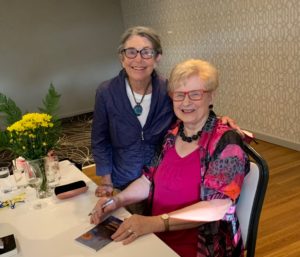
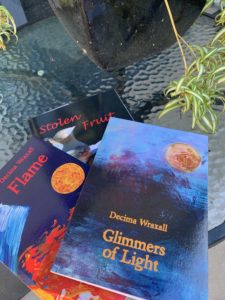
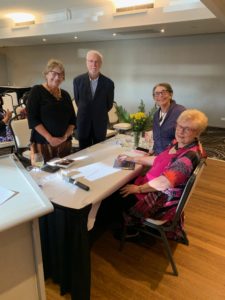


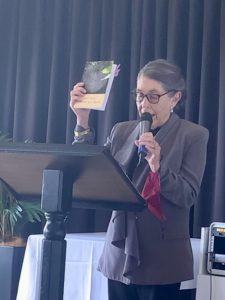




 ‘
‘













